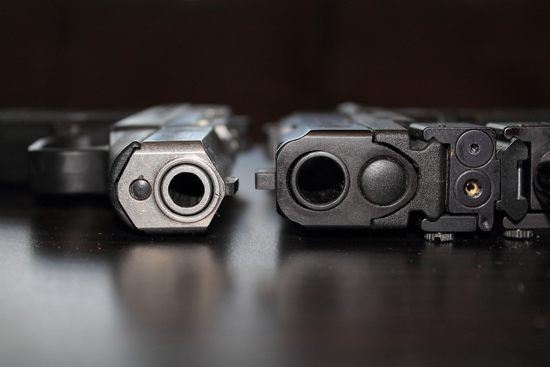University Will Not Divest from Firearms Manufacturers
Trustees find issue does not warrant action

The issue of divesting from civilian firearms manufacturers was brought to the Board of Trustees by the ACSRI in May 2014 and was comprehensively debated at Board meetings in September and December.
After a protracted deliberation that spanned two meetings of the Board of Trustees, the Board’s Executive Committee has decided not to adopt a recommendation from the Advisory Committee on Socially Responsible Investing (ACSRI) that the University divest from civilian firearms manufacturers.
Robert Knox (CAS’74, GSM’75), chair of the Board of Trustees and of the Executive Committee, described the deliberation as “a big sprawling discussion that reflected a full spectrum of opinions.” When the Board did not find the “overwhelming consensus” required to support the proposal, the issue was referred to the Board’s 14-member Executive Committee, which determined that it should not be adopted.
The recommendation that “Boston University will prohibit new and divest of any existing direct investments in civilian firearm manufacturers until, in the University’s judgment, a level of state and/or federal regulatory control over firearm sale and/or ownership is achieved that merits repeal of this policy” is the first proposal to the Board from the ACSRI, which was established two years ago as an interface between the BU community and the Board of Trustees. The trustees first discussed divestment from gun manufacturers in the wake of the shooting of 20 schoolchildren and 6 adults at the Sandy Hook Elementary School in Connecticut in December 2012, before the ACSRI has been established. The issue was brought to the Board by the ACSRI in May of last year, and was the subject of comprehensive debate at Board meetings in September and December.
In response to Sandy Hook and other shootings, New York State’s public pension fund and California’s fund for teachers have frozen or divested their gun holdings. Trustee Rick Reidy (SMG’82), chair of the ACSRI, says he knows of no university that has moved to divest from companies that manufacture civilian guns. Reidy says the ACSRI decided to present the issue to the Board of Trustees to see if it “reached the bar” that would persuade the University to take action. He says that while the proposal was not adopted, the discussions did compel the Board to codify the principles that guide its consideration of recommendations for divestiture.
Those principles, described last Wednesday in a memorandum sent to ACSRI members by Knox, are as follows:
- When the Board, acting on behalf of the University, is asked to prohibit investments of the endowment in a given industry or in companies doing business with a particular government, it is being asked to express an opinion or take action on an external social or political issue that, in the overwhelming majority of cases, is not directly related to the operations of the University.
- A fundamental goal of Boston University is to create an environment in which an academic community can productively consider, discuss, and debate a variety of viewpoints on social and political issues and that encourages freedom of inquiry. Such conditions allow scholars to pursue knowledge according to standards of evidence and logic without the encumbrance of an institutional position that may dampen discussion of alternative views. When the University, as an entity, adopts a single viewpoint or takes action relating to divestment, it risks undermining that goal. Therefore, non-investment or divestment actions based on social or political principles should be very rare and occur in only the clearest of circumstances, and should be judged to withstand the test of time in terms of how the wisdom of the University’s decision will be judged by future generations.
- Such circumstances exist only when (i) the degree of social harm caused by the actions of the firms in the asset class is clearly unacceptable; and (ii) any potential negative consequences of the decision (including the risk of censorship of competing views within the University or the risk that the wisdom of the decision will fail to withstand the test of time) are clearly outweighed by the importance of taking the divestment action in order to lessen or mitigate the social harm.
“Following this process and applying these principles,” Knox wrote to the ACSRI, “the Board did not reach overwhelming consensus on the proposal from the ACSRI to divest from civilian firearm manufacturers. The Board therefore referred the proposal to the Executive Committee. Taking the considerations described above into account, the Executive Committee has determined that the proposal of the ACSRI should not be adopted.”
President Robert A. Brown says the lasting value of the discussions lies in the principles that evolved from it concerning if and when the University should be used as a tool for social advocacy. “The discussion was about what our standards for that should be,” Brown says. “And the answer is, ‘Not never, but it’s a very high bar.’”
The ACSRI, which meets at least once annually, comprises three trustees, three faculty members, and one graduate and two undergraduate students. Dean of Students Kenneth Elmore (SED’87) and Brown sit as ex-officio members.
At least five of the committee’s nine members must vote in support of a recommendation for it to be passed along to the Board of Trustees, and that majority must represent a member from each stakeholder group.
Reidy says the ACSRI has been discussing a proposal that the University divest from fossil fuels, and may present a recommendation to the Board in the coming months.

Comments & Discussion
Boston University moderates comments to facilitate an informed, substantive, civil conversation. Abusive, profane, self-promotional, misleading, incoherent or off-topic comments will be rejected. Moderators are staffed during regular business hours (EST) and can only accept comments written in English. Statistics or facts must include a citation or a link to the citation.